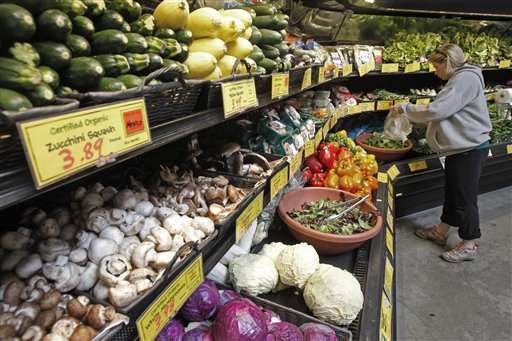5 things: House bill would prevent mandatory GMO labeling

States could no longer require labels on genetically modified foods under legislation the House is considering.
The legislation scheduled for a vote Thursday is backed by the food industry, which has fought state labeling efforts around the country. So far, Vermont is the only state set to require the labels.
The country's largest food companies say genetically modified foods are safe and labels would be misleading. They say a patchwork of laws around the country would be expensive for companies and confusing for consumers.
Advocates for the labeling say people have a right to know what is in their food and criticize House Republicans for pushing a bill that would take away states' discretion to require the labels.
Five things to know about the House bill:
IT WOULD DERAIL VERMONT'S LAW
Vermont passed a law last year that requires labeling foods that contain genetically modified organisms, or GMOs. It will take effect in July 2016—if it survives a legal challenge from the food industry. The House bill, sponsored by Kansas Republican Mike Pompeo, would void Vermont's law and prevent other states from enacting laws like it.
Maine and Connecticut have also passed laws requiring the labeling, but those measures don't take effect unless neighboring states follow suit.
The House bill would make it harder for the Food and Drug Administration to require labeling of modified foods nationally. The agency has already said it won't require labeling and that GMO foods are safe.
Genetically modified seeds are engineered in laboratories to have certain traits, like resistance to herbicides. The majority of the country's corn and soybean crop is now genetically modified, with much of that going to animal feed. They are also made into popular processed food ingredients like high-fructose corn syrup, corn starch and soybean oil.
NEW, VOLUNTARY LABELS
The House bill would create a new certification process at the Agriculture Department for foods that are labeled free of GMOs. That would mean anyone wanting to use that label would eventually have to apply.
Organic foods would be automatically certified, since they are already required to be free of engineered ingredients.
The voluntary labeling program has some bipartisan support. Rep. Chellie Pingree, a Maine Democrat who is also an organic farmer, strongly supports mandatory labeling but says the certification program would at least ensure that foods currently labeled as free of GMOs are held to a uniform standard.
STEPPED-UP FDA OVERSIGHT
The FDA has a safety review process for GMO crops but it isn't mandatory. The bill would require that new genetically modified foods go through that safety process before they can be sold.
It would also require the FDA to issue rules on how the word "natural" can be used on food packages and prevent states from enacting any similar laws.
PUBLIC SUPPORTIVE OF LABELING
A December Associated Press-GfK poll found that two-thirds of Americans support labeling of genetically modified ingredients on food packages.
Many of those who support the labels say they have no problem buying GMOs, but think there should be more accountability in the food industry. Rep. Jim McGovern, D-Mass., said in a speech opposing the bill on the House floor Wednesday that he eats GMOs, but thinks it should be a choice.
Michael Gruber of the Grocery Manufacturers of America, the lead industry group fighting mandatory labels, says those who want the labels are trying to scare people away from genetically modified foods. "This is to tear down brands in the name of right to know," Gruber said.
The food industry says about 75 percent to 80 percent of packaged foods contain genetically modified ingredients.
THE PROSPECTS
There is no similar bill in the Senate, although Sen. John Hoeven, R-N.D., has said he is working on legislation.
Agriculture Secretary Tom Vilsack has been supportive of genetically modified crops and has touted voluntary labeling solutions like special bar codes on packages to allow consumers to access information via smartphone.
Opponents of the bill are working to stop the legislation after expected House passage. Many environmental and consumer groups are fundraising off the issue.
"More than ever, consumers want to know what's in their food, but this dishonest bill takes us in the wrong direction," celebrity chef Tom Colicchio wrote in a pitch for the Environmental Working Group.
© 2015 The Associated Press. All rights reserved.




















